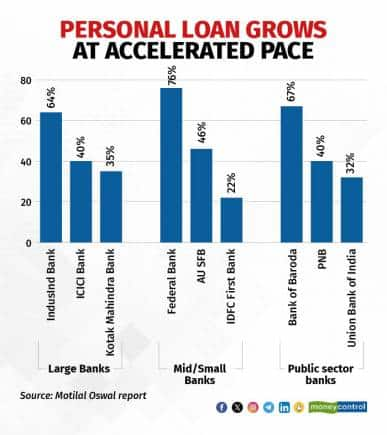



The Reserve Bank of India increased risk weight on consumer credit exposure of commercial banks and non-banking financial companies (NBFCs) by 25 percent as it has been uncomfortable with persistent growth seen in unsecured personal loans and credit cards. This, analysts believe, will hit SBI Cards the hardest hit due to highest unsecured credit composition, followed by RBL Bank and Bajaj Finance.
“The new norms would impact SBI Cards the most as 100 percent of their portfolio will witness an increase in risk-weight. For Bajaj Finance, about 43.6 percent of its portfolio will be impacted,” said analysts at InCred Equities.
Nomura highlighted that NBFCs will see a higher impact on growth and profitability versus other financial institutions as they have seen sharpest increase in exposure to unsecured retail lending.
ALSO READ: SBI Cards, Bajaj Finance, HDFC Bank tumble up to 6% as RBI raises risk-weight on consumer loans
“Unlike banks, the impact on NBFCs is on both sides of the balance sheet (assets and liabilities), and our calculations suggest that the increase in risk weights on bank loans to NBFCs could push up the cost of bank borrowings for NBFCs by ~10- 30 basis points (bps) and dampen capital ratios by ~30-450 bps,” a note from the financial services company said.
NBFCs’ credit growth in unsecured retail credit surged to 50 percent year-on-year during Q2FY23-Q2FY24, while that of banks accelerated to 34 percent in Q2FY24 over the previous year.
That apart, State Bank of India (SBI) and ICICI Bank are also expected to be hit as they have relatively elevated portfolios of consumer credit at 29.5 percent and 26.3 percent of the total, respectively, as of September 2023. This will be followed by Axis Bank with a portfolio of consumer credit share of 23.7 percent.
The central bank said that the consumer credit exposure for banks and NBFCs, excluding housing, education, vehicle, and gold-backed loans, will attract a risk weight of 125 percent from 100 percent earlier. The risk weight for credit card loans by banks was fixed at 150 percent versus 125 percent earlier. Those by NBFCs will see a risk weight of 125 percent, up from 100 percent.
ALSO READ: Axis Bank shares fall 2% after RBI raises risk-weight on consumer loans, imposes penalty
How will various players be affected? RBL Bank, SBI Cards to see worst impact
For banks, analysts at Motilal Oswal expect impact in capital ratios to be in the range of 60-84 bps, with the highest impact on RBL Bank, HDFC Bank, and ICICI Bank. For the large private banks, even after this adjustment the capital levels would remain healthy, but for PSUs (especially SBI), depletion in capital is significant and could warrant a capital raise.
For NBFCs, Nomura built impact of Tier-1 ratios in the range of 30-450 bps with the maximum impact on SBI Cards, which could warrant a capital raise. After SBI Cards, Bajaj Finance will likely see an impact of 250 bps.

That said, analysts at Nomura said that they continue to prefer banks over NBFCs. “Our top picks among banks are ICICI Bank, Axis Bank, and IndusInd Bank. Among NBFCs, we prefer Five Star, Bajaj Finance, and Shriram Housing Finance,” they wrote in a morning note.
RBI’s move a dampener for credit growth
Macquarie underlined that the new RBI’s risk-weight order would spell double trouble for NBFCs and banks as loan growth is likely to slowdown from here on.
A higher risk implies the bank will have to set aside a higher amount as loan provisioning. This, therefore, would impact capital ratios of lenders and compel them to increase interest rates on such products to curb impact on return of equity. As a result, loans would be more expensive for borrowers from this measure.
ALSO READ: Personal Finance: Five reasons why your credit score can turn bad
The unsecured retail loans have been growing by 20-60 percent year-on-year (YoY) across major lenders and have been a cause of concern as highlighted by the regulator in recent months (see chart).

Credit card growth, too, has been in the fast lane for most lenders (see chart). While Axis Bank’s credit card loans grew by 74 percent annually, Kotak Mahindra Bank and IDFC First Bank saw growth of 59 percent and 58 percent, respectively.

On the personal loan front, IndusInd Bank topped the chart in the private sector lender category as loans grew by 64 percent from a year earlier (see chart).

Bank of Baroda claimed the top spot in personal loan growth at 67 percent on an annualised basis, whereas Federal Bank’s personal loan growth was the highest among commercial banks (see chart).
Fintech firm Paytm’s disbursements exhibited strong traction for personal and unsecured loans as well.

Personal or unsecured loans of Paytm grew by 122 percent over the previous year to Rs 16,200 crore in the July-September quarter of fiscal year 2023-24 (Q2FY24).
ALSO READ: RBL Bank, SBI Card tank up to 10%, hit hardest by RBI's revised personal-loan norms
Housing finance companies unhurt by RBI’s risk-weight order
Analysts at Morgan Stanley believe that housing finance stocks could be tactical beneficiaries in this situation as they stand unaffected by new RBI norms.
“We are bullish on Can Fin Homes, PNB Housing Finance, Aptus, and Home First,” analysts added.
Disclaimer: The views and investment tips expressed by investment experts on Moneycontrol.com are their own and not those of the website or its management. Moneycontrol.com advises users to check with certified experts before taking any investment decisions.
Discover the latest Business News, Sensex, and Nifty updates. Obtain Personal Finance insights, tax queries, and expert opinions on Moneycontrol or download the Moneycontrol App to stay updated!